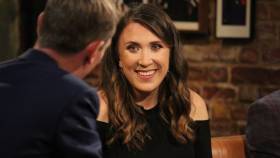Displaying items by tag: The Late Late Show
Annalise Murphy Talks 'Rollercoaster' Years Before Olympic Medal Win on The Late Late Show
#AnnaliseMurphy - Annalise Murphy has spoken of how the sting of missing out on a medal at London 2012 haunted her over the years of preparations for the Rio Olympics this summer – till she decided to make sailing fun again.
The Laser Radial silver medallist was a guest on last night's Late Late Show on RTÉ One – now available to watch on demand on the RTÉ Player – where she opened up to host Ryan Tubridy about the pressure her experience in Weymouth put her under.
"That medal race in London, it's kind of haunted me for the last four years," she said. "I always had this sort of voice in the back of my head, thinking maybe that was my moment and I messed it up.
"Olympic medals, they're really hard to come by, and I thought, maybe I wasn't going to get a medal in Rio, and that was going to be as good as it was going to get."
Murphy described her training in the intervening four years as a "rollercoaster", in particular last year's test event at the Rio sailing course, intended to see what shape she was in for this summer's games, where she placed last in the first day's races.
"The harder I tried, the 'more last' I would come," she said. "I nearly had to see the funny side of it, [because] I'd trained so hard and it just wasn't working out for me."
Murphy said the turning point was when she realised "I haven't been having fun, I need to start enjoying this again."
As a result, she regained her confidence "and in the last couple of months leading into the Olympics, I really felt like I was having good form and everything might start to work out my way."
Murphy credits her coach Rory Fitzpatrick, sports psychologist Kate Kirby and training partner Sara Winther with establishing a routine during the daunting week of racing in Rio, and keeping her "always in a really good frame of mind, just really enjoying it. Not getting stressed out, when I think of how some of the other competitors were."
But into the final medal race, she says she "suddenly had the fear of 'Oh no, I'm going to finish fourth again, this is going to be terrible.'"
Getting out on the water, the windy conditions gave a boost to the erstwhile 'Queen of the Breeze'.
However, when things got a bit too gusty, and Murphy suffered a number of capsizes, the race was postponed and she recalls: "At that stage I just wanted it to be done.
"I went into that [rescheduled medal] race thinking 'If I'm afraid ... I'm going to lose out.' I went in with zero fear. I was just like, 'You have to go and attack this race and see what happens.'"
It wasn't till she was in second place around the last windward mark, alongside Great Britain's Alison Young, and knowing both were far ahead of their closest rivals, that she realised a silver medal was hers at the very least.
"For it all to suddenly come together at the right time, it was just this feeling of relief," she said.
"Now I can look back and go, 'That was a really good fourth place in London.'"
Earlier in the evening, rowing silver medallists at Rio – and Afloat.ie rowers of the month for May 2015 – Paul and Gary O'Donovan shared their own story with Tubridy from the Late Late Show couch, which is also available on the RTÉ Player till 2 October.
























































